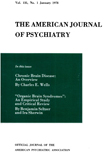PSYCHIATRIC OBSERVATIONS UNDER SEVERE CHRONIC STRESS
Abstract
The reactions and behaviour of the internees of the internment camp, Theresienstadt, are described. They were characterized by remarkable uniformity. Every adult internee experienced an initial phase of reactive depression. Although the capacity for, and the degree of, adjustment to camp life varied with different people the final outcome of the adapting process became uniform again owing to the physiological and psychological sequelæ of the constant and severe stress.
The incidence and course of the various psychiatric conditions occurring in the camp are discussed. No influence of the life and conditions in the camp on endogenous psychoses could be observed. Senile dementia and other organic psychoses, on the other hand, were influenced to a considerable degree.
No new cases of psychoneuroses originated in Theresienstadt. Old and long-lasting conditions of that kind improved to such an extent that the patients could be considered as practically cured. After the liberation, however, neurotic reactions could be observed in some of the former internees.
Access content
To read the fulltext, please use one of the options below to sign in or purchase access.- Personal login
- Institutional Login
- Sign in via OpenAthens
- Register for access
-
Please login/register if you wish to pair your device and check access availability.
Not a subscriber?
PsychiatryOnline subscription options offer access to the DSM-5 library, books, journals, CME, and patient resources. This all-in-one virtual library provides psychiatrists and mental health professionals with key resources for diagnosis, treatment, research, and professional development.
Need more help? PsychiatryOnline Customer Service may be reached by emailing [email protected] or by calling 800-368-5777 (in the U.S.) or 703-907-7322 (outside the U.S.).



